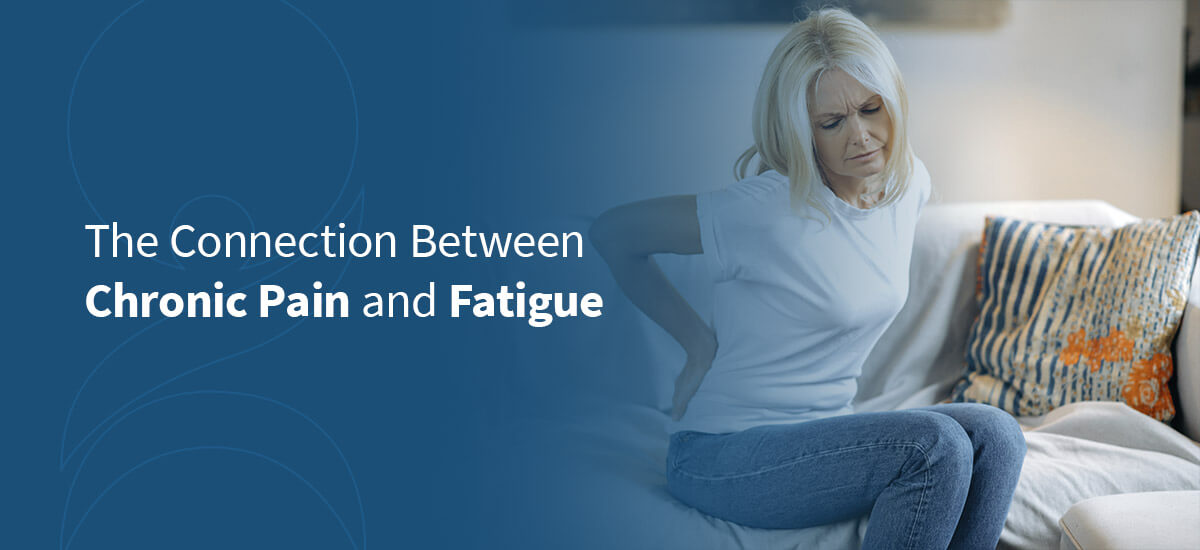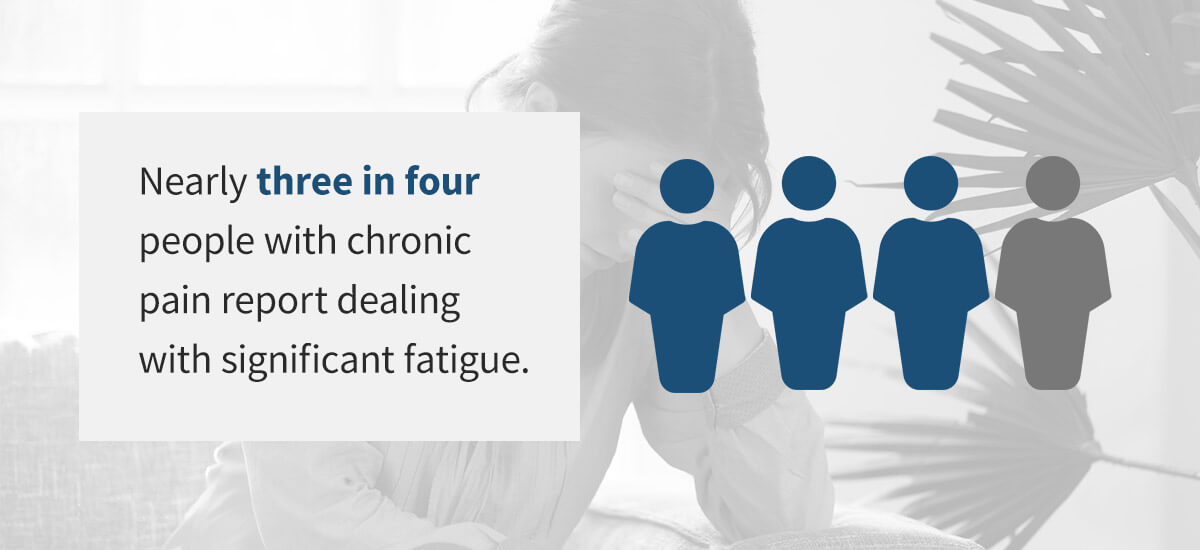Many individuals who suffer from conditions that cause chronic pain report feelings of fatigue. If you’re living with chronic pain from conditions like fibromyalgia or arthritis and can’t shake your tiredness or lack the energy to do simple activities, you know what an impact it can have on your life.
Keep reading to learn more about the connection between chronic pain and fatigue.
What Is Chronic Pain?
Pain is a signal to the body that something is wrong. In general, there are two classifications for pain — acute and chronic. Acute pain is a signal that something is presently wrong, such as with an injury, while chronic pain is long-term and sometimes lasts weeks, months or years. Generally, healthcare providers classify pain as chronic if it lasts six months or longer.
Conditions that might lead to chronic pain include:
- Injuries
- Infections
- Arthritis
- Cancer
- Nerve pain
- Back pain
- Fibromyalgia
Chronic pain may also develop without a strict identifying cause. It is more common in older adults, with women reporting more chronic pain than men since they are more susceptible to many conditions that cause chronic pain.
Suffering long-term chronic pain can lead to:
- Fatigue
- Lack of appetite
- Limited mobility
- Depression
- Anger
- Anxiety
What Is Fatigue?
Fatigue is a condition in which a person lacks energy and motivation and feels weariness and tiredness that impacts their daily activities. While fatigue can be an innocuous condition resulting from physical activity, emotional stress or boredom, problems arise when rest and good nutrition do not relieve the symptoms of fatigue.
Many conditions can cause fatigue, including:
- Kidney disease
- Liver disease
- Malnutrition
- Autoimmune disorders
- Arthritis
- Lupus
- Cancer
- Diabetes
- Heart failure
- Infections
Medicines may also cause fatigue as part of their side effects. Antihistamines and sleeping pills can cause drowsiness and fatigue, as well as certain steroids and blood pressure medications. If you are feeling fatigued and it does not resolve through simple remedies like getting enough sleep, eating a healthy diet and seeking out a low-stress environment, you should speak with a health care provider.
Is There a Connection Between Pain and Fatigue?
If you suffer from chronic pain and find yourself constantly tired — to the point where it interferes with your daily life — you may wonder if there’s a connection between your chronic pain and tiredness. Many studies that have sought out the causes of chronic fatigue find that those who experience long-term fatigue often suffer from conditions that cause chronic pain.
One study determined that, among those with chronic pain and diseases, there is a high prevalence of severe and chronic fatigue. Furthermore, the study showed that those suffering from multiple chronic conditions are more likely to experience chronic fatigue.
Fibromyalgia is a chronic condition that causes widespread musculoskeletal pain. Researchers often look at this condition when determining the connection between chronic pain and fatigue because patients with fibromyalgia often experience lasting fatigue in addition to their chronic pain.
Why Does Chronic Pain Cause Fatigue?
Nearly three in four people with chronic pain report dealing with significant fatigue. This issue is widespread, and researchers are still looking into the factors that contribute to the connection. The following factors detail how chronic pain can lead to fatigue:
- Poor sleep: When one is uncomfortable or in pain, sleep may not come as readily. Additionally, chronic pain may also manifest as restlessness, making it hard to settle down. These factors may inhibit restorative sleep, meaning your body does not get enough rest, which can compound to cause persistent fatigue.
- Lack of exercise: Pain can also make you less likely to exercise or engage in active pursuits, which can impact your ability to sleep. Frequent inactivity can cause a loss of muscle mass, which has been shown to cause fatigue.
- Eating an unbalanced diet: Standing in front of the stove cooking a healthy meal might be the last thing you want to do if you’re suffering from pain and fatigue. However, eating fast food or frozen meals does not provide the body with the necessary nutrients to function optimally. Eating an unbalanced diet may also contribute to your feelings of chronic pain and fatigue.
- Inflammation: If your chronic pain is a result of inflammation, that could also be causing your fatigue. Inflammation occurs when cytokines tell our body to increase blood flow to a certain area, but the side effect of these proteins is pain and fatigue. If you suffer from a condition that causes inflammation, these cytokines may be causing your pain and fatigue.
- Stress and anxiety: When someone experiences pain, their stress levels often increase. Studies have shown that someone experiencing chronic pain may have increased cortisol levels, the major stress hormone for the body. Stress impacts your quality of sleep because your body is in a constant state and fight or flight.
- Depression: Experiencing pain often causes you to miss out on activities you enjoy, which can impact your mental health and cause depression. One of the major symptoms of depression is excessive fatigue, which may be exacerbated if you have both depression and chronic pain.
How to Live With Chronic Pain and Fatigue
Whatever your experience with chronic pain and fatigue, living day to day with these conditions is challenging. While there may not be a catch-all solution to your struggles, a few solutions have documented success in helping people manage their pain and fatigue. These solutions include:
1. Getting Plenty of Rest
While sleep may not come easily to you if you experience constant pain, getting enough rest is vital for your body. Patients with fibromyalgia and other conditions that cause chronic pain often struggle to fall asleep or stay asleep. Fortunately, there are both therapeutic and medicinal ways to help you get some rest.
Therapeutic ways to help people fall asleep include:
- Guided sleep meditations
- Limiting or eliminating caffeinated beverages
- Exercise
- Reducing stress
- White noise
There are other ways to help ensure you get plenty of rest, like sleeping in a dark, quiet space and ensuring things like bedding and temperature are at your ideal comfort levels. If these methods do not help, your doctor may prescribe you a medicinal sleep aid.
2. Eating a Balanced Diet
Eating a balanced diet doesn’t always mean standing in the kitchen for hours on end, cooking complicated recipes. Healthy foods are good for your body because they contain the necessary vitamins, minerals and nutrients you need to function your best. Simple foods like whole grains, nuts, vegetables, fruits and fish can help you manage chronic pain and give you more energy.
You can also eat an anti-inflammatory diet, which promotes foods that reduce inflammation. Carbohydrates, sugar, red meat and dairy products are a few foods you may want to avoid if your chronic pain and fatigue result from painful inflammation.
3. Confronting Challenging Emotions
Mental health disorders like anxiety and depression exacerbate the negative emotions associated with chronic pain and fatigue. Many people feel anxious and overwhelmed from being in a constant state of pain. It’s also easy to feel hopeless if you do not know the cause of your chronic pain, but friends, family and support groups are essential to help you cope with these emotions.
If your feelings are starting to impact your daily life, it’s important to confront these emotions head-on. Seeking support from a trained counselor is one of the bravest things you can do to manage challenging emotions. You might also find that activities like volunteer work help you find a purpose outside yourself, keeping your mind from sinking into hopelessness and despair.
Contact UCC-NY to Cope With Chronic Pain
If you suffer from chronic pain and fatigue, you may have exhausted various treatment options and had unsuccessful results. At Upper Cervical Chiropractic of New York, we use gentle adjustments and realignments to treat pain. For more information or to schedule a consultation, contact our office today.
REVIEWED BY DR. GEORGE GERTNER

Dr. George Gertner is a family man, healer, philanthropist, author of “The Gift of Hope”, public speaker, and founder of one of the world’s busiest Upper Cervical Chiropractic clinics.
After receiving his bachelors degree in biology from Hofstra University in Hempstead, NY Dr. Gertner moved to Atlanta, GA to attend Life University. Before graduation, Dr. Gertner had a severe injury to his lower back. Traditional chiropractic procedures were not providing relief until he met a chiropractor that specialized in NUCCA (National Upper Cervical Chiropractic Association.)
Then he spent the next two years mentoring from one of the best Upper Cervical doctors; learning in the same office that helped change his life. After two years, Dr. Gertner returned home to New York to open his own office. He currently is one of less than 300 NUCCA chiropractors worldwide.
Dr. Gertner has been featured numerous times in Chiropractic Monthly Magazine for his expertise in treating Trigeminal Neuralgia and Myofascial Pain. Dr. Gertner has lectured locally and nationwide discussing various symptoms using the Upper Cervical technique.




